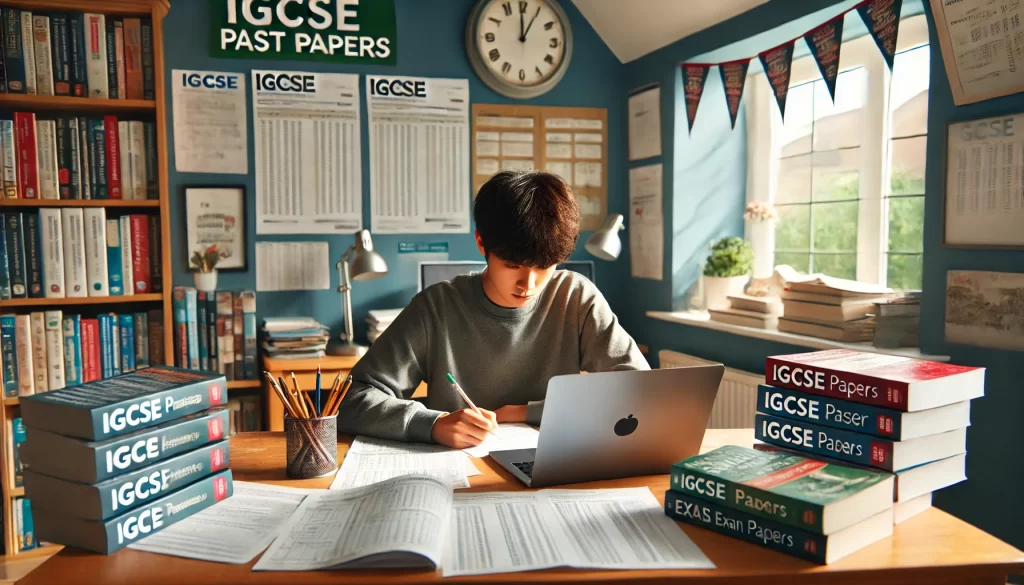Preparing for IGCSE exams can be challenging, but one of the most effective tools at your disposal is the use of IGCSE past papers. These past exam papers offer invaluable insight into the types of questions you might encounter, the exam structure, and the level of difficulty. In this blog, we’ll discuss how using IGCSE past papers can significantly boost your exam preparation and performance.
Why Are IGCSE Past Papers So Important?
Past papers give students a practical way to prepare for their exams by helping them:
- Understand the Exam Format: Exam papers follow a specific structure and style, and reviewing past papers can help students become familiar with this format.
- Practice Time Management: Time constraints are a critical factor in exams, and practicing with past papers allows students to refine their time management skills.
- Identify Knowledge Gaps: By answering past paper questions, students can see where their understanding is lacking and focus their revision on these areas.
- Reduce Exam Anxiety: Familiarity with the style and format of questions can help reduce stress and build confidence going into the exam.
Step-by-Step Guide to Using IGCSE Past Papers Effectively
1. Start Early in Your Revision Process
It’s crucial to incorporate past papers into your study routine well before the exam date. Starting early gives you ample time to review your mistakes, re-learn concepts, and apply your knowledge to similar questions in the future.
Pro Tip: Begin with past papers after you’ve covered the syllabus to test your initial understanding, and then revisit them periodically as your knowledge deepens.
2. Simulate Real Exam Conditions
To get the most out of past papers, try to simulate real exam conditions. This means timing yourself according to the actual exam duration and answering questions without the help of notes or textbooks.
Why It’s Important:
- Practicing under timed conditions helps improve your ability to manage time during the real exam.
- This method also gives you a feel for the pressure of an exam environment, making you more comfortable during the actual test.
3. Review Marking Schemes
Most websites offering IGCSE past papers also provide marking schemes. After completing a past paper, always review the answers against the marking scheme. Pay attention to how points are awarded and the level of detail expected in your answers.
How It Helps:
- It helps you understand what examiners are looking for, so you can tailor your responses to meet their expectations.
- Reviewing marking schemes allows you to learn from your mistakes and adjust your answers for future practice papers.
4. Track Your Progress
As you work through different past papers, keep track of your scores and identify areas where you’re consistently making mistakes. This will highlight the topics or question types that need extra attention.
Tip: Use a progress sheet or a notebook to log your scores, topics that need further revision, and personal notes on recurring errors. This will make your revision more focused.
5. Work on Weak Areas
Once you’ve identified weaker areas through past paper practice, make those topics your revision priority. Focus on re-learning concepts, practicing additional questions, or seeking help from tutors for difficult topics.
At Edunostic Learning Center, we offer personalized tutoring sessions to help students overcome specific challenges in subjects like Maths, Sciences, English, and more. Our tutors can guide you through difficult topics and provide targeted assistance where you need it most.
6. Review Examiner Reports
Many IGCSE past paper websites, like Cambridge International’s official site, provide examiner reports along with past papers. These reports contain detailed feedback on how students typically performed in the exam and common mistakes to avoid.
Why You Should Use Examiner Reports:
- They provide insight into what the examiners are looking for.
- They highlight common mistakes that you can avoid in your own answers.
- They offer valuable tips on how to approach tricky or high-mark questions.
Where to Find IGCSE Past Papers
Several trusted websites provide free access to IGCSE past papers, marking schemes, and examiner reports. Here are some recommended sources:
- Cambridge International – Official site for a wide range of IGCSE past papers and exam resources.
- XtremePapers – Offers a large collection of past papers for IGCSE and A-Level exams.
- PapaCambridge – A platform offering easy access to past papers, notes, and examiner reports.
- GCE Guide – Provides downloadable past papers and marking schemes for a variety of subjects.
- TeachifyMe – A helpful site for IGCSE past papers, study resources, and revision guides.
Final Thoughts
Incorporating IGCSE past papers into your revision strategy is one of the most effective ways to prepare for exams. It not only helps you get familiar with the format and style of questions but also builds confidence as you practice under real exam conditions. Make sure to simulate exam scenarios, review marking schemes, and track your progress for the best results.
If your child is preparing for IGCSE exams and needs additional support, Edunostic Learning Center offers personalized tutoring designed to target their specific needs. From understanding complex topics to improving exam techniques, our experienced tutors are here to help.
Contact us today to learn more about how we can support your child’s academic journey!




